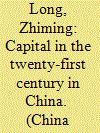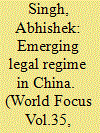| Srl | Item |
| 1 |
ID:
086323


|
|
|
|
|
| Publication |
2009.
|
| Summary/Abstract |
After more than a decade of preparation, China finally passed the Anti-Monopoly Law (AML) on 30 August 2007. This paper examines the debate over whether or not administrative monopoly should be included in the ambit of the AML, which took place throughout the drafting process of this new law. Administrative monopoly refers to the abusive use of administrative power by government agencies to engage in monopolistic activities. Owing to the administrative nature of this type of monopoly, the intent to regulate it by an economic law, such as the AML, has stirred up much controversy. Having analyzed the arguments both in support of and in opposition to the inclusion, this paper suggests the need to adopt a more comprehensive scheme in tackling administrative monopoly. Also, the enforcement mechanism of the AML will have to be strengthened in order to prevent this new law from degenerating into 'a toothless tiger'. Furthermore, the competition law regime of China will benefit from in-depth research in overseas anti-monopoly practices. In particular, the experiences of the former socialist states in Europe should be taken into account, given that they are similarly undergoing the transition from a planned economy to a market economy.
|
|
|
|
|
|
|
|
|
|
|
|
|
|
|
|
| 2 |
ID:
161847


|
|
|
|
|
| Summary/Abstract |
We propose a method of constructing a general capital stock à la Piketty for China from 1952 to 2015 (Part 1). The elasticities of income with respect to this capital are econometrically estimed through equations which also integrate human capital and R&D. The tests are performed within frameworks of modern neoclassical macrodynamic models. On this basis, we calculate an implicit rate of return of capital to test the validity of what Piketty states as a “fundamental inequality”, comparing rate of return on capital and income growth rate in the long run. This inequality is verified, but appears to be tendentiously challenged over the last decade. Then, Piketty's “second law”, arguing that the coefficient of capital tends to be equal to the ratio between savings rate and income growth rate, is examined. This “second law” is to be viewed as a process of asymptotic convergence in the long term (Part 2). These results are compared with new estimates for the post-1978 sub-period of “capitalism with Chinese characteristics”, but the fundamental inequality is no longer verified, and it is not reasonable to affirm the validity of the “second law” (Part 3). Finally, we address the issue of the inequalities in China.
|
|
|
|
|
|
|
|
|
|
|
|
|
|
|
|
| 3 |
ID:
129687


|
|
|
|
|
| Publication |
2014.
|
| Summary/Abstract |
The Chinese Communist Party (CPP), which was established in 1929, successfully unified mainland China in 1949 and founded a new nation Peoples Republic of China (PRC). In the next three decades, the communist government tried to safeguard and built the nation in principle with Communist-Maoist ideology both economically and politically. During this period, the function of law and the legal system was to serve as an instrument for the ruling communist government at large. As a result, the scope for proper legal regime in China suffered significantly from the chaos and disorder caused by endless class struggle.
|
|
|
|
|
|
|
|
|
|
|
|
|
|
|
|